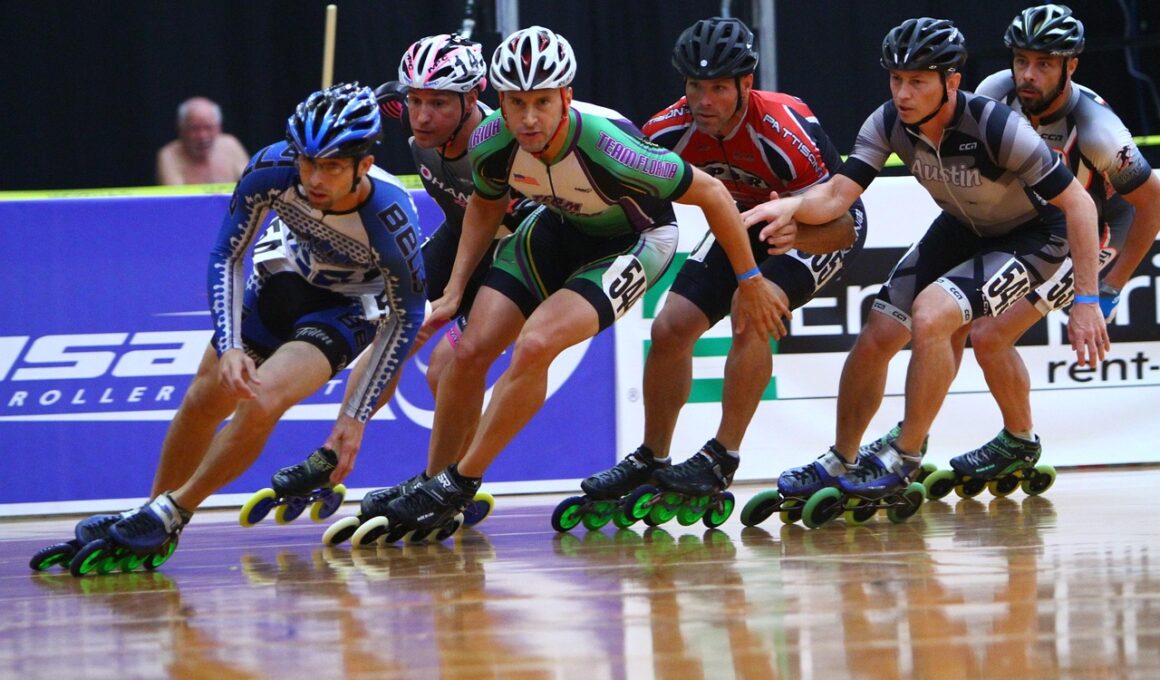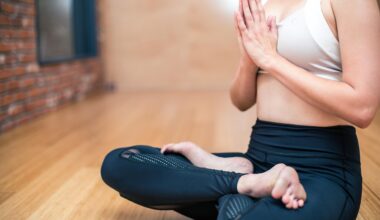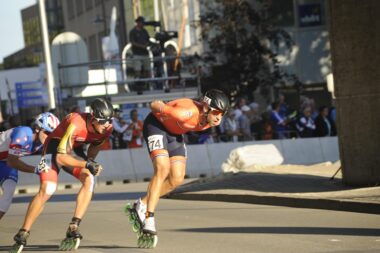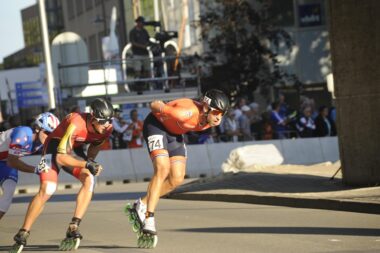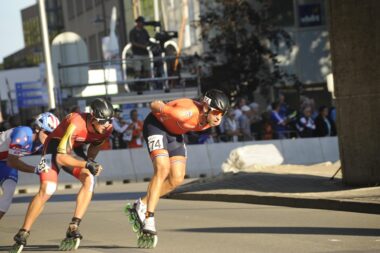Recovery Strategies for Speed Skating Athletes
To optimize performance, speed skating athletes must understand the critical importance of recovery. Recovery strategies should be tailored specifically to meet individual needs, addressing personal training intensity and stress levels. A well-structured recovery plan is essential for health, allowing athletes to regain strength and prevent injury. Key recovery techniques include active recovery, nutritional strategies, and sleep enhancement. Active recovery promotes blood circulation and reduces fatigue. This might involve low-intensity exercises post-training. Equally important is nutrition, focusing on replenishing glycogen stores. Athletes should consume carbohydrates and proteins within 30 minutes post-exercise for effective recovery. Protein aids muscle repair while carbs restore energy levels. Additionally, hydration plays a crucial role. Dehydration can impair both recovery and performance, making adequate fluid intake essential. Sleep, often overlooked, is another pillar of recovery. Aim for 7-9 hours of quality sleep per night to support muscle recovery and mental clarity. Consider incorporating relaxation techniques to improve sleep quality, such as meditation or yoga. In summary, a multifaceted approach to recovery ensures athletes remain competitive throughout the season.
Active recovery sessions, while often underestimated, significantly benefit speed skaters. Engaging in light activities between intense training can help flush out metabolic waste and alleviate post-workout soreness. Simple exercises like brisk walking, cycling, or swimming can facilitate this process. Additionally, stretching after workouts diminishes muscle tightness and enhances flexibility, reducing the risk of injury. It is advisable for athletes to dedicate time to both dynamic stretches before training and static stretches post-workout to maintain muscle health. Another effective method worth incorporating into recovery routines is foam rolling. This self-myofascial release strategy helps release muscle knots and improve blood flow. A simple five to ten-minute session can make a significant difference. Furthermore, athletes can consider professional massage therapy to further promote relaxation and expedite recovery after rigorous training blocks. Scheduling regular massages can lead to improved performance and quicker recovery times. Combining these active recovery techniques with other methods creates a stronger overall recovery strategy. Ultimately, speed skaters must listen to their bodies. Individual responses to recovery modalities may vary widely, so exploring various techniques enhances personal performance outcomes in the sport.
Nutritional Strategies for Optimal Recovery
A speed skater’s recovery plan must include a comprehensive nutrition strategy to ensure optimal results. Nutrition directly affects recovery time and overall athletic performance. Prioritize a balanced diet rich in macronutrients including carbohydrates, proteins, and fats for complete recovery. Carbohydrates are vital for replenishing glycogen stores after exhausting workout sessions, while proteins play a significant role in muscle repair. Aim for a ratio of approximately 3:1 carbs to protein for the best recovery benefits. Whole foods should be emphasized, with fruits, vegetables, and whole grains forming the basis of daily meals. Incorporating lean protein sources, such as chicken, fish, beans, and legumes, supports muscle rebuilding. Hydration is another factor that shouldn’t be ignored. Proper hydration boosts recovery and can dramatically influence performance; dehydration negatively impacts coordination and strength. Athletes should also consider electrolyte replenishment post-exercise, especially after long or intense workouts. Smoothies or recovery shakes can simplify the process of ingesting necessary nutrients quickly. Tailoring nutritional strategies to individual preferences and lifestyles ensures adherence to a recovery regimen, maximizing benefits and promoting a healthy relationship with food. Adequate nutrition ultimately enhances training effectiveness.
Incorporating sleep hygiene into recovery strategies will provide a profound impact on the performance of speed skating athletes. The quality of sleep affects cognitive function, decision-making abilities, and recovery speed, making it crucial for optimizing overall health. Athletes should aim to create a sleep-friendly environment; keeping bedrooms dark, quiet, and cool can promote deeper, more restful sleep. Staying consistent with sleep schedules by going to bed and waking up at the same times every day can also improve sleep quality. Limiting screen time before bed is equally important, as blue light emissions can disrupt sleep cycles. Instead, engaging in relaxing activities such as reading or gentle stretching can ease the transition to sleep. Consuming calming herbal teas or magnesium-rich foods may also enhance relaxation and promote sleep. For athletes struggling to achieve optimal sleep quality, consider tracking sleep patterns to identify relevant issues or distractions. Developing a personalized routine that encourages good sleep hygiene supports quick recovery and optimal performance on the ice. Strategies should be revisited regularly to maintain effectiveness, ensuring athletes remain prepared for both training and competition throughout their season.
Mental Recovery Techniques
Mental recovery is a critical aspect for competitive speed skaters. While physical recovery is essential, mental sharpness can significantly influence performance outcomes. Stress and fatigue accumulate over time, affecting motivation and focus. Therefore, incorporating psychological recovery strategies into training routines is paramount. Techniques like mindfulness meditation can help skaters manage stress and enhance focus. Mindfulness helps athletes remain present during their performances, reducing anxiety. Regular practice can improve emotional regulation, providing athletes with the tools to cope with competition pressures. Visualization is another effective technique, where athletes mentally rehearse optimal performances, boosting confidence and concentration. Creating a positive mental environment fosters resilience, allowing skaters to remain adaptable. Engaging in activities outside of speed skating, such as hobbies or socializing, can also provide mental breaks and prevent burnout. Athletes should prioritize self-care as part of their routine, nurturing their mental health just as rigorously as their physical health. Finding the right balance between training and leisure activities sustains enthusiasm for the sport. Ultimately, integrating mental recovery techniques alongside physical recovery will elevate overall performance levels and longevity in speed skating.
Regular assessments of recovery strategies ensure speed skaters are optimizing their methods effectively. Recovery monitoring tools, such as training logs or wearable technology, can provide insights into the efficacy of techniques being applied. By tracking sleep patterns, physical performance metrics, and overall energy levels, athletes can identify trends that inform their recovery choices. It is vital for athletes to recognize when their bodies require more rest and adjustment in their routines. Seeking feedback from coaches about training loads can also aid in determining when to increase or decrease intensity. Participating in recovery workshops or seminars can expand an athlete’s knowledge of current recovery trends and practices within the sports community. Engaging with peers likewise fosters collaborative learning, as sharing personal experiences can lead to the discovery of effective strategies. Through continuous learning, athletes refine their approach to recovery, adapting as necessary to optimize performance. Ultimately, recovery strategies should be personalized, as every athlete responds differently to various techniques. Evaluating and adjusting strategies regularly ensures that speed skaters maintain competitive advantages while safeguarding their health and wellness throughout their careers.
Conclusion
Recovery strategies are vital components of any successful speed skating program. By implementing a holistic approach, athletes can ensure they remain physically and mentally prepared for the challenges of high-performance sport. This process involves understanding individual needs and adjusting recovery strategies accordingly. Active recovery, nutritional support, sleep hygiene, and mental recovery techniques combine to form a well-rounded, effective recovery plan. By acknowledging that recovery is an ongoing journey, speed skaters can commit to lifelong learning. As performance expectations grow and evolve, so too should recovery practices, diving deeper into the increasingly scientific understanding of athlete recovery. Ultimately, a dedication to recovery will safeguard against injury, enhance physical and mental performance, and prolong an athlete’s competitive career in speed skating. Prioritizing recovery leads not only to improved results but also fosters a positive attitude towards training and competition. Athletes must remember that their greatest gains come from their recovery strategies, ensuring they continuously strive for improvement. Thus, adopting and adapting these strategies is a testament to an athlete’s commitment to success and longevity in the sport of speed skating.
